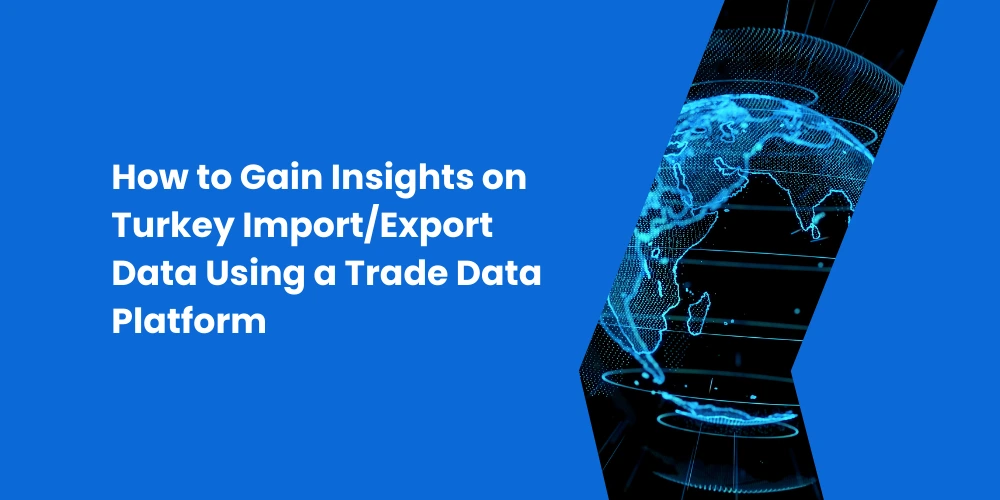Table of Contents
Introduction
In the vast ocean of international trade, the efficient movement of goods from producers to consumers is paramount for businesses seeking to thrive in global markets. At the heart of this intricate web of logistics lies shipping data—a treasure trove of information that provides invaluable insights into the complex world of transportation and logistics. In this blog post, we’ll dive deep into the realm of shipping data, exploring its significance, applications, and how businesses can harness its power to navigate the seas of commerce with precision and efficiency.
Unraveling the Layers of Shipping Data
Shipping data encompasses a wide array of information related to the transportation of goods across various modes of transport, including sea, air, rail, and road. This data includes details about:
Shipment Details: Information about the goods being transported, including descriptions, quantities, and values.
Transportation Modes: Details about the modes of transportation used to move the goods, such as container ships, airplanes, trucks, or trains.
Routes and Transit Times: Insights into the routes taken by shipments and the estimated transit times from origin to destination.
Carriers and Logistics Providers: Information about the companies responsible for transporting and delivering the goods, including shipping lines, freight forwarders, and logistics providers.
Shipping Documents: Documentation related to the shipment, such as bills of lading, invoices, and customs declarations.
The Significance of Shipping Data
Shipping data plays a crucial role in various aspects of supply chain management and international trade:
Logistics Optimization: By analyzing shipping data, businesses can optimize their logistics operations, identifying the most efficient transportation routes, carriers, and modes of transport to minimize costs and transit times.
Inventory Management: Shipping data provides insights into the movement of goods, allowing businesses to manage their inventory levels effectively and avoid stockouts or excess inventory.
Customer Service: Timely and accurate shipping data enables businesses to provide better customer service by keeping customers informed about the status of their shipments and providing accurate delivery estimates.
Risk Management: Shipping data helps businesses identify and mitigate risks associated with transportation, such as delays, disruptions, or damage to goods in transit.
Trade Analysis: Shipping data provides valuable insights into global trade patterns, including the volume and value of goods being transported between countries, helping businesses identify market trends and opportunities.
Applications Across Industries
E-commerce Sector: In the e-commerce industry, shipping data is a vital tool for optimizing supply chain operations and enhancing customer satisfaction. For example, online retailers use shipping data to track the movement of products from warehouses to fulfillment centers and ultimately to customers’ doorsteps. By analyzing shipping data, e-commerce companies can identify bottlenecks in the delivery process, streamline logistics operations, and improve shipping times. Moreover, real-time tracking capabilities enable customers to monitor the status of their orders, providing transparency and peace of mind.
Manufacturing Industry: In manufacturing, shipping data is instrumental in managing raw material procurement, production scheduling, and distribution of finished goods. Manufacturers leverage shipping data to monitor the movement of raw materials from suppliers, track work-in-progress inventory between production facilities, and coordinate the delivery of finished products to distributors or retailers. By analyzing shipping data, manufacturers can optimize inventory levels, minimize transportation costs, and ensure timely delivery of goods to meet customer demand.
Agricultural Sector: In agriculture, shipping data plays a crucial role in the distribution of perishable goods such as fruits, vegetables, and dairy products. Farmers and producers rely on shipping data to transport their products from farms to distribution centers and retail outlets. By tracking shipping data, agricultural businesses can optimize transportation routes, minimize spoilage during transit, and ensure fresh produce reaches consumers promptly. Additionally, shipping data helps agricultural exporters comply with international trade regulations and quality standards, facilitating smooth cross-border trade.
Healthcare and Pharmaceuticals: In the healthcare and pharmaceutical industries, shipping data is essential for the distribution of medical supplies, vaccines, and pharmaceutical products. Healthcare providers, pharmaceutical companies, and logistics firms use shipping data to maintain the integrity of temperature-sensitive medications, monitor the delivery of critical supplies to hospitals and clinics, and ensure compliance with regulatory requirements. Real-time tracking of shipments is particularly crucial for time-sensitive medical supplies and emergency response efforts, where delays can have life-threatening consequences.
Consumer Goods and Retail: In the consumer goods and retail sectors, shipping data is instrumental in managing inventory levels, optimizing distribution networks, and enhancing the efficiency of last-mile delivery. Retailers leverage shipping data to track the movement of products from warehouses to brick-and-mortar stores or fulfillment centers, as well as direct-to-consumer shipments for online orders. By analyzing shipping data, retailers can forecast demand, reduce stockouts, and improve the accuracy of delivery estimates, thereby enhancing the overall customer experience.
Case Study: Amazon
For example, let’s consider an e-commerce giant like Amazon. By harnessing the power of shipping data, Amazon can optimize its vast network of fulfillment centers, distribution hubs, and delivery routes to ensure speedy and reliable delivery of millions of products to customers worldwide. Updated tracking allows customers to monitor the status of their orders from placement to delivery, enhancing transparency and trust. Amazon’s use of shipping data enables it to offer services like same-day or next-day delivery, setting the standard for efficiency and convenience in the e-commerce industry.
Conclusion
By incorporating these practical examples and case studies, readers can gain a deeper understanding of how shipping data drives efficiency, innovation, and competitiveness across various industries. For further insights into global trade and logistics, explore TradeInt’s comprehensive comparison with Panjiva to understand the superiority of TradeInt over Panjiva, learn about import and export data and its significance, unlock trade insights with mirror data and its applications, understand the legality of trade data platforms with TradeInt and its approach, delve into TradeInt’s approach to trade data confidentiality and its importance, comprehend the causes and implications of trade data discrepancy, explore the TradeInt online trade database platform release and its features, and discover the innovative global trade services offered by Trade Intelligence Global Pte Ltd and its benefits.
To learn more about the topics discussed in this blog post, you can explore the following additional resources:
- Unveiling the Superiority of TradeInt over Panjiva: A Comprehensive Comparison
- Unveiling the Superiority of TradeInt over TenData: A Comprehensive Comparison
- What is Trade Data? Understanding Import and Export Data
- Unlocking Trade Insights with Mirror Data
- Understanding the Legality of Trade Data Platforms
- Trade Data Confidentiality: Understanding TradeInt’s Approach
- Understanding Trade Data Discrepancy: Causes and Implications
- TradeInt Online Trade Database Platform Release
- Trade Intelligence Global Pte Ltd: Innovative Global Trade Services
About Trade Intelligence Global Pte. Ltd.
Trade Intelligence Global Pte. Ltd. is a distinguished leader in global trade solutions, delivering exceptional results for businesses worldwide. With a focus on excellence, innovation, and client success, Trade Intelligence Global empowers businesses to thrive in today’s interconnected global economy. To find out more, visit https://tradeint.com.
FAQ
TradeInt is a comprehensive global trade data platform by Trade Intelligence Global Pte Ltd, that provides businesses with access to accurate and reliable trade data insights for informed decision-making and strategic planning.
TradeInt employs rigorous data collection methodologies and quality assurance processes to ensure the accuracy and reliability of its global trade data. This includes leveraging advanced algorithms, data validation techniques, and manual verification procedures to filter out inaccuracies and discrepancies.
Yes, TradeInt caters to businesses of all sizes and industries, offering customizable solutions to meet their specific needs and requirements. Whether you’re a small startup or a large multinational corporation, TradeInt provides different pricing plans and scalable features to accommodate businesses at every stage of growth.
TradeInt is committed to providing exceptional customer support to its users. Our dedicated support team is available to assist with any inquiries, technical issues, or product-related questions that users may have. We offer various channels of communication, including email, live chat, and phone support, ensuring prompt and personalized assistance whenever needed.
TradeInt’s pricing plans are transparent and straightforward, with no hidden fees or additional costs. Our pricing is based on the chosen plan and the number of users, providing businesses with clarity and predictability in their expenses. Users can also upgrade their plans at any time to better align with their evolving needs and budget.
Compared to other leading trade intelligence platforms, TradeInt stands out for its comprehensive data coverage, advanced analytics capabilities, user-friendly interface, dedicated customer support, and flexible pricing options. Our platform offers a unique combination of depth, accuracy, and usability, making it the preferred choice for businesses seeking actionable insights and competitive advantage in the global marketplace.



